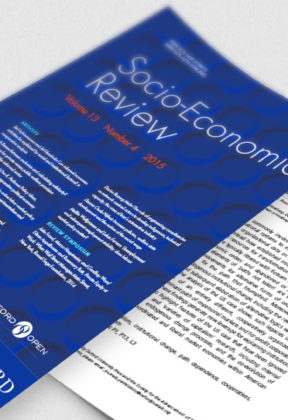2025
Socio-Economic Review Café on Gender Workplace Inequalities
January 24th, 2025, 5pm CET
An engaging SER Café event featuring a discussion with SER authors, Anne-Kathrin Kronberg, Anna Gerlach, Marta Fana, Davide Villani, and Martina Bisello.
In “Off to a slow start: which workplace policies can limit gender pay gaps across firm tenure?”, Kronberg and Gerlach explore how workplace policies impact gender pay gaps over employee tenure. In “Gender gaps in power and control within jobs”, Fana, Villani and Bisello study gender gaps in workplace power and control and argue that women face more control than men in the same job, even after accounting for factors like education and seniority.
Together, these papers offer insights into the interplay between workplace practices, organizational culture, and policy interventions in perpetuating or mitigating gender inequalities. Both provide us with a deeper understanding of the structural barriers and potential pathways toward closing gender gaps.
2024
Socio-Economic Review Cafe: The Socio-Economics of Climate Change (May 2024)
SER Cafe: Contemporary Capitalism through the Lens of Institutions (March 14th, 2024)
Featuring a conversation with SER authors Carly R. Knight (New York University), and Ann-Christine Schulz (Institute for Digital Transformation and Strategy) and Alexander Himme (Kuehne Logistics University)
Join us for a discussion of contemporary capitalism through institutional studies. Knight, in “Classifying the corporation: the role of naturalizing analogies in American corporate development, 1870–1930,” traces the history of the classification of the corporation and argues that the symbolic privatization of the corporation was the joint product of both liberal and progressive legal theorizing, and these “naturalizing analogies” are critical to understanding the symbolic structure of corporate capitalism. Schulz and Himme, in “Stock market reactions to downsizing announcements: an analysis through an institutional lens”, examine stock market reactions to corporate downsizing using a neo-institutional perspective and demonstrate the performance effects of corporate downsizing and investors’ role in legitimizing this prevalent business practice.
—–
Socio-Economic Review Cafe: The Financialization of Households
Featuring a conversation with SER authors Marek Mikuš (Max Planck Institute for Social Anthropology), and Xiaojing Wang and Anne-Marie Ward (both of Ulster University)
Join us for a discussion of how the state and the financial economy are implicated in contemporary household finance. Bobek, Mikuš, and Sokol, in “Making sense of the financialization of households,” review the state-of-the-art literature on this topic and argue that household participation in the financial economy constitutes “a systematic transfer of value from the bottom of society to the top.” Wang and Ward advance a policy proposal for resolving household overindebtedness in their paper “Socio-economic framework for the design of national household insolvency systems,” that takes into account variations in political orientations to indebtedness and levels of social insurance provisions between countries.
Come and join us to discuss how socioeconomic research on household financialization can inform policy solutions for its negative consequences. The event will take place on Wednesday, January 24th, at 9AM PST/12PM EST/6PM CET. Register at this link!
2023
The first SER Café of 2023 was held on Thursday, February 9 at 4pm UTC (11am US Eastern/8am US Pacific/5pm Central European).
We spoke with Ekaterina Svetlova (University of Twente) and Akos Rona-Tas (UC San Diego) about the relationship between technology, economy, and society.
The authors discussed their respective SER articles, “AI Meets Narrative: The State of Research on Expectation Formation in Sociology and Economics” (2021) and “Predicting the Future: Art and Algorithms” (2020).
The third SER Café of 2023 will be held on Monday, June 19, at 11am EST/ 8am PST/ 5pm CET! We will be speaking with Cèline Bessiére (Paris Dauphine University), alongside Daria Tisch (Max Plank Institute for the Study of Societies) and Tamara Gutfleisch (Manneheim Centre for European Social Research) about the relationship between intergenerational transfers, wealth, and gender inequality. The authors will briefly discuss their respective SER articles, “Reversed Accounting: Legal Professionals, Families, and the Gender Wealth Gap in France” (2019) and “Unequal but Just? Experimental Evidence on (Gendered) Distributive Justice Principles in Parental Financial Gifts” (2022).
We will follow the discussion with an extended Q & A session. Please use this link to register for this timely conversation!
——————————-
Socio-Economic Review Café: Close Relationships, Trust, and the Economy
The event will take place on Thursday, November 16th, at 9 AM PST/12 PM EST/6 PM CET. Register at this link! The audience is expected to have read the articles.
Featuring a conversation with SER authors Wenjuan Zheng (Hong Kong University of Science and Technology), David Shulman (Lafayette College), and Kent Grayson (Northwestern University)
Join us for a discussion of close relationships and the potential and pitfalls of trust in the economy, as well as the ways technology can mediate these dynamics. Shulman and Grayson’s paper “Et Tu, Brute? Unraveling the puzzle of deception and broken trust in close relations” (2023) discusses why closeness, as with friends or coworkers, is no guarantee of trust, revisiting theoretical discussions of trust to shed light on detection errors and associational dilemmas. Meanwhile, Zheng’s paper “Converting donation to transaction: how platform capitalism exploits relational labor in non-profit fundraising” (2023) investigates what happens when platforms intermediate trusting relationships, demonstrating how they reconfigure charity events and mediate civic interactions through invisible value extraction.
Together, these papers offer insights into how trust is built, maintained, and challenged in a world increasingly facilitated by technology.
As with all SER Cafe events, we will facilitate a dynamic conversation with the authors rather than lengthy talks. Come ready to engage.
2022
The inaugural SER Café took place on 3 June 2022 at 4pm UTC (12pm US Eastern/9am US Pacific/6pm Central European).
The Platform Economy
Featured Articles
Both articles were published in SER’s special issue on Understanding the Platform Economy.
The conversation was moderated by SER student interns Gokhan Mulayim, Amy Knight, and Bernardo Mackenna.
Sponsored by the Society for the Advancement of Socio-Economics
